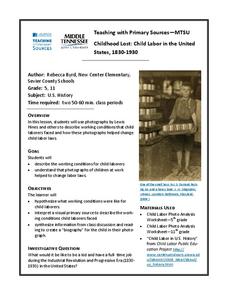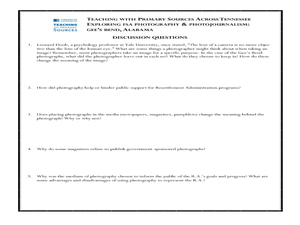Jamestown-Yorktown Foundation
Making a Patriot Inquiry: Are Independence, Freedom, and Liberty the Same Thing?
As part of a study of the American Revolution, class members engage in an inquiry-based lesson that has them watch a scene from the play Slave Spy, examine multiple primary source documents, and then discuss the similarities and...
Center for History Education
Women's Rights in the American Century
Today, many young people find it hard to understand why it took over 150 years for women in the United States to get the right to vote—why there was even a need for the suffrage movement. As they read a series of primary source...
National Endowment for the Humanities
The War in the North, 1775–1778
Using primary source documents, including maps, learners examine Revolutionary War events from 1775 to 1778. The focus here is on the challenges George Washington and the Continental army faced and how they persevered in spite of those...
National History Day
A Clever War: Scientific and Technological Advances in World War I
Technology—changing lives and transforming war. Your tech-loving historians examine photographs and primary documents to explore how technology changed not only World War I, but also how it moved society forward. They apply their...
University of Wisconsin
Why Did the Triangle Fire Occur?
An investigation of the 1911 New York City Triangle Shirtwaist Factory fire leads class members to examine primary and secondary source materials related to the event and apply what they learn about the working conditions at the time to...
Stanford University
Hurricane Katrina
The adage says that journalism is the first draft of history. How should people evaluate these sources of information? Taking into account various sources, including those from various perspectives and different creators, learners...
Curated OER
Childhood Lost: Child Labor in the United States, 1830-1930
Working in groups, middle and high schoolers describe and discuss photographs depicting working conditions experienced by child laborers in the 19th century. They then write a persuasive paragraph supporting an amendment to regulate the...
PBS
Evaluating Conflicting Evidence: Sultana
What sunk the Sultana? Scholars become investigators to uncover the facts behind the 1865 sinking just after the end of the Civil War. Through group work, videos, and primary documents, they research and analyze why 1,800 men died....
Jamestown-Yorktown Foundation
What Was Everyday Life like in Colonial Virginia?
After reflecting on jobs people perform in the present day, scholars discuss what they believe jobs would have been like in Colonial Virginia during the American Revolution. Small groups then perform a jigsaw using informational packets....
Curated OER
Teaching with Primary Sources Across Tennessee
Students examine Gee's Bend Alabama. In this resettlement lesson, students view a series of photographs taken of Gee's Bend Alabama. Students will write a series of newspaper articles based on the images, that exemplify the evolution of...
iCivics
Congress
Through reading materials, worksheets, and a primary source activity, this resource provides an overview of the structure and powers of the legislative branch of government in the United States. Readings review how a bill becomes a law,...
Curated OER
Teacher Notes
Gathering information, distinguishing between arguments, preparing an oral presentation; these skills are fostered as 10th graders explore aspects of global trade and politics. They use the Internet to gather information about NATO, The...
Curated OER
"Uncle Sam's Got Himself in a Terrible Jam": Protest Music and the Vietnam War
"And it's one, two, three...what are we fighting for?" Use music to assess the climate of protest during the Vietnam War, listening to and analyzing Country Joe MacDonald's "I-Feel-Like-I'm-Fixin'-To-Die Rag" (lyrics included)....
Curated OER
The Changing Role of Women
Eleventh graders examine the evolution of women's rights in America. As they analyze primary documents and discuss historical events, learners determine how Abigail Adams, Eleanor Roosevelt, Lady Bird Johnson, Margaret Sanger, and James...
PBS
African American History: Climbing the Wall
Imagine the challenge of trying to trace your family genealogy if no records were kept of births and deaths. Where would you look for information? What types of documents could provide you with the information you seek? History...
National Endowment for the Humanities
Lesson 2 James Madison: The Second National Bank—Powers Not Specified in the Constitution
How much power is too much power for the federal government? Scholars use primary documents and constitutional research in groups to analyze the creation of the Second National Bank under James Madison. This is the second lesson of a...
National Endowment for the Humanities
Revolution '67, Lesson 1: Protest: Why and How
To some people, protesting is as American as apple pie, but the factors that lead to protests can be as confusing to veteran activists as to today's youth. Revolution '67 explores the riots in Newark, New Jersey as a case study. Using...
Carolina K-12
Are You a Democrat or a Republican? Are You Really?
Have new or soon-to-be voters examine different political parties and their platforms as they figure out which one aligns most with their beliefs. After taking a few online quizzes, students split into pairs to discuss and then in larger...
Curated OER
Progressives Perspectives
Eleventh graders consider the case for Progressive politics. In this Progressive Era lesson, 11th graders read excerpts from The Jungle as well as articles about the Triangle Shirtwaist Factory fire. Students also analyze images from the...
Benjamin Franklin Tercentenary
The Autobiography of Benjamin Franklin
Need a model for character education? Benjamin Franklin presents himself as in a constant state of striving to become the man he hoped to be, making his autobiography is far more accessible to learners than those of people who consider...
Alabama Department of Archives and History
Strange Fruit: Lynching in America
To continue their study of the Civil War, Reconstruction, and the beginning of the civil rights movement, class members watch the YouTube video of Billie Holiday singing "Strange Fruit" as an introduction to an examination of lynching in...
Habits of Mind
Haileybury Habits of Mind Learning Resource Book
Imagine a learning community committed to using Costa and Kallick's Habits of Mind as the basis of curriculum design. The resource book is packed with lessons that are designed for and identify the standards and habits of mind targeted...
Smithsonian Institution
The Soldier’s Experience—Vietnam versus World War I
The Vietnam War and World War I were two very important—and different—wars. To understand the differences, and similarities, class members watch videos, examine primary source documents, and then create a newscast that examines the...
Curated OER
Socratic Seminar on Martin Luther King, Jr.’s Letter From Birmingham Jail
Key in the struggle to gain the rights of democratic citizenship was the April 1963 arrest of Dr. Martin Luther King, Jr. for civil disobedience. To deepen their knowledge and understanding of events during the civil rights movement,...

























